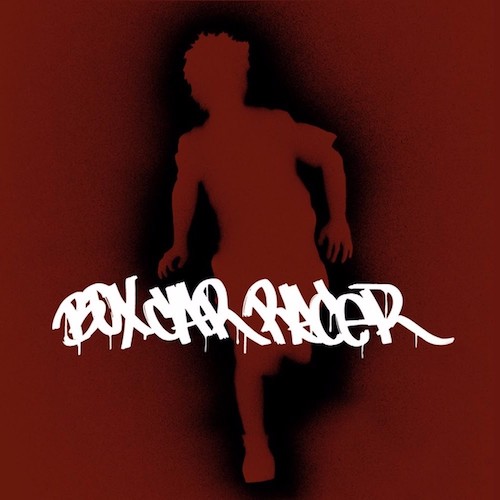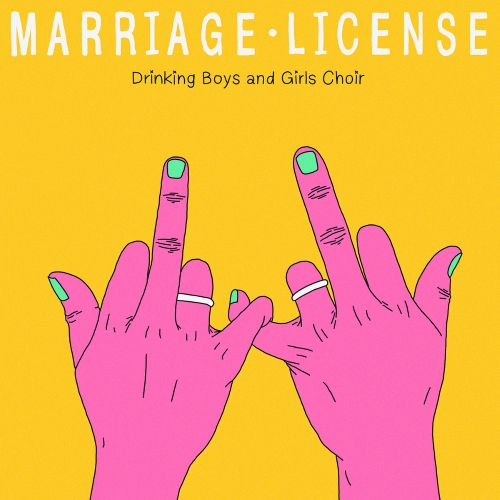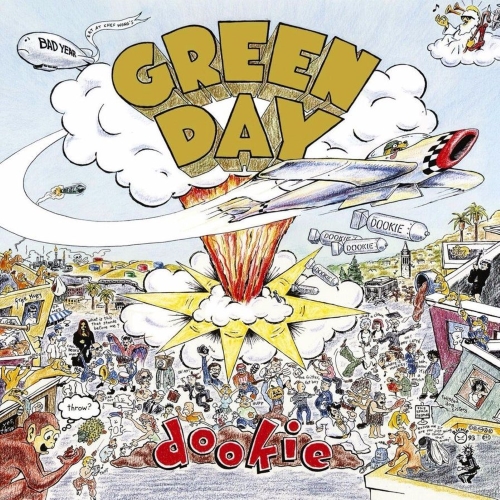

Box Car Racer
Box Car Racer
blink-182 is a very special band to me. While not as influential today over my own musical pursuits or my listening habits, this band was the beginning for me. Without them, I'm not sure I would have made the decision to pick up an instrument. I'm not sure I would have wanted to start a band. I'm not sure I would have met the important people in my life that helped shape and evolve my musical taste into what it is today. It's a little frightening to imagine what my life would be like had blink-182 not put me on this trajectory. So in honour of this silly band who is entering their thirtieth year of existence, I will be reflecting upon each release in their discography, as well as maybe a few choice selections that are relevant to blink's timeline. In this segment, we see how the band reached their creative peak and the aftermath that lead to the band's first hiatus.
After nearly ten years with the band, Tom DeLonge felt like he had exhausted himself creatively with blink-182. During a break between blink albums, he took the opportunity to explore a more emotional, angsty, and artistically more mature sound. Taking queues from seminal post-hardcore bands like Fugazi and Quicksand, DeLonge formed Box Car Racer along with Travis Barker on drums and friend David Kennedy also on guitar. Now, I could be wrong, but I get the sense that people don't give this record the respect it deserves. DeLonge and blink were known for making sickly sweet pop-punk readymade for mainstream radio. On top of that, DeLonge - despite being a complex individual - was more known for his tasteless humour rather than any of the thoughtful songs he wrote up to that point in his career. Box Car Racer's one and only album is still largely labeled as a pop-punk record even though you don't really hear those elements at all. I guess it is difficult for some people to reconcile that DeLonge can actually create something serious, genuine, and also good. If you want my honest opinion though, Box Car Racer is not just good, it's a post-hardcore and emo masterpiece.
One of the reasons why I say this is because, to this day, Box Car Racer is one of the most dynamic records I've ever heard, strictly in the sense of volume. There's a few things at play here that are making this happen. For one, it is my understanding that Barker recorded performances on two different drum kits, one with smaller sized shells, and one larger. The effect it creates is a smaller, more intimate setting where the isolated soul-searching can take place. When we are ready to expel all that bottled up tension, Barker will then switch to the larger set to create explosive and cathartic choruses. While this is a really creative way tonally to differentiate between these loud and soft sections, the bulk of the heavy lifting to create this ultra dynamic sound is acheived by the album's mixing and mastering. In the calmer moments, the volume is deceivingly quiet, to the point where I find myself wanting to turn the volume up. However, when the song goes into the louder sections, the mix is absolutely crushed. Every single instrument is blaring and on top of that, it feels like there's a bit of clipping distortion as the sheer volume on some of these sections is slammed violently against a brick wall. This is a constant element, a defining feature of the entire record, but you can hear it most notably on tracks like All Systems Go, Watch the World, Tiny Voices, and Sorrow.
On a more personal note, I just really love the confrontational and angular sound of DeLonge's riffs and chord progressions. I Feel So switches between the major keys of G and E (I think, please don't come for me), and that transition is quite jarring in an exciting way. Tiny Voices also has a jarring key change between verses and choruses as well, but it's the large octave leaps, just shy by a half step, on both the intro and chorus riffs that really grab me. And I realize I'm getting more into the theory of things here, but there are many songs that make use of this first and third chord interval (All Systems Go, My First Punk Song and The End With You) which is the basis for some of my favourite chord progressions. I find it helps regulate that tension and release as any angsty feelings that come up when it is played is always resolved as soon as we reach one of the major chords in the key.
I guess the last thing I will praise about this album is its ability to take a few stylistic detours and still be consistently engaging. We have the more toned down Cat Like Thief and Elevator which don't have a whole lot of instrumental development, but are meditative in their repetitiveness. That's not to say that there is no sense of movement at all as both tracks build towards the end with additional layers of guitars, vocals, and string arrangements. These two tracks also feature the only two guest vocal spots on the record, helping make these tracks a little more interesting. Tim Armstrong (of Rancid fame) brings a lot of character to the former with his noticeably weathered voice, and DeLonge taps into that blink vocal chemistry by including Mark Hoppus on the latter. There's also My First Punk Song which is just a straight up hardcore tune. It is loud, it is fast, and it is aggressive as hell with DeLonge's uncharacteristically pissed performance and application of vocal distortion. The lyrics are a little absurd which could give the appearance of a joke song on the surface, although, I think I read it as a satirical response to the criticism that artists should stay out of politics. When DeLonge does resort to dick jokes, he does so in an intentionally annoying, almost mocking inflection.
I love this record through and through, and it does carry a lot of significance for the blink timeline. With the knowledge of how to incorporate these post-hardcore sounds into his writing, DeLonge was able to take blink into new, more emotionally potent directions. With the feelings of abandonment and betrayal that began to form after being relegated to the sidelines, Hoppus was able to meet DeLonge on the same wavelength. Without this record, it's hard to imagine that blink-182's evolution into a more mature, artistically respectable band would translate as well as it did to a world that expected nothing more than juvenile punchlines, and thus be as successful.
10
Standouts: The part where the album makes my head rattle.
Post-Hardcore, Emo (2002) MCA. Reviewed May 28th, 2022


blink-182
blink-182
blink-182 is a very special band to me. While not as influential today over my own musical pursuits or my listening habits, this band was the beginning for me. Without them, I'm not sure I would have made the decision to pick up an instrument. I'm not sure I would have wanted to start a band. I'm not sure I would have met the important people in my life that helped shape and evolve my musical taste into what it is today. It's a little frightening to imagine what my life would be like had blink-182 not put me on this trajectory. So in honour of this silly band who is entering their thirtieth year of existence, I will be reflecting upon each release in their discography, as well as maybe a few choice selections that are relevant to blink's timeline. In this segment, we see how the band reached their creative peak and the aftermath that lead to the band's first hiatus.
blink's self-titled album is no doubt the band's most creative and artistic moment. Tom DeLonge and Travis Barker spent time away from the band exploring other sounds and when the trio regrouped, there was reluctance to go back to that sugary pop-punk sound. The band's new home of Geffen records also opened them to new possibilities as the label didn't seem to be as interested in another helping of straight pop-punk like MCA was in the past. With time, resources, and creative freedom, blink totally changed how they operated in the studio. Instead of tackling the album one instrument at a time, the band would build each track from a completely blank state, resulting in songs that had their own unique identity. With a library of guitars, amps, effects, snare drums, and whatever else, every single sound on this record was meticulously crafted. You might have heard the term 'over-produced' before, where in the context of any rock genre implies that a record sounds so belaboured that it no longer feels like this genuine, spontaneous expression of raw emotion. You'd think that would apply to this record but that couldn't be further from the truth. Every single move the band makes feels absolutely necessary and is always in service of the feeling blink is trying to manifest.
Like Box Car Racer, blink's self-titled record is hardly the carefree pop-punk experience you would come to expect from the trio. blink even lowers you into a false sense of security by kicking the album off with its most pop, 'typical' blink offering the album has. Feeling This begins with an amazing drum break that is saturated in phasing effects, making me feel like I'm about to take off in a jet. The guitar riff is one of the catchiest in blink's discography with it's sliding octave chords, and DeLonge's carnal roars (about sex of course) are also pretty passionate. After a boomy bridge with spacious drums and distant hollers, we eventually come to an epic close when layers and layers of vocals are stacked on top of each other. It is a little cacophonous, but I would mostly describe it as euphoric. It is the most fun the record gets, tonally speaking, and it quickly falls into a dark rabbit hole thereafter. On Obvious, DeLonge recounts the numerous attempts to salvage a toxic relationship, backed by a guitar progression and tone that are very fittingly somber; really lacking in any sort of colour. In the chorus, we have ringing power chords that hang in the air until a catchy lead guitar melody finishes the phrase, and I also love the inclusion of the giant bells. It also feels so spacious comparatively to the rest of the song with the added reverb effects. Everything rings like a revelation as DeLonge sings "at times like these, it's obvious," finally giving in to the fact that this cycle is doomed to repeat and that it is better to end this relationship. After repeating this cycle twice, the song mysteriously fades out only to return with a vicious post-hardcore section with busy drums and swiftly changing chords.
blink continues down this post-hardcore road on a few more tracks and approach this style, in my opinion, with a great deal of authenticity. Aside from nailing the dynamics between verse and chorus sections, Violence has supremely thrilling elements. I love the way DeLonge mashes on this single chord in the intro, bending wildly up and down to create an unsettling tone. The pulsing 808s, reverbed auxillary percussion, the muddy bass, and the reversed vocal effects make for cavernous, moody, amazing verses. Stockholm Syndrome once again exceeds expectations. There's some odd timing in the beginning of the track that eventually leads to a rhythmic phrase that creatively skips over the downbeat. DeLonge practically shrieks on this track and there's a section here where Hoppus sounds uncharacteristically alive. The song's structure is also very linear, bravely stepping out of the verse/chorus/verse/chorus format that is typically associated with pop songwriting.
Speaking of bravery, blink takes a lot of risks experimenting with sounds that are largely unfamiliar with their audience. I'll admit, when first hearing this record nearly twenty years ago, I didn't quite understand it. I had no frame of reference for the new wave synths on Always, the classy, goth, theatricality of I Miss You, the space and prog rock of Asthenia, and the percussion forward, sinister, and subtly industrial East Target. It wasn't until years later that I really started to enjoy the lengths the band went to to subvert expectations, and some of the more unlikely blink songs ended up becoming my favourites. One such tune is the Robert Smith assisted All of This. Nearly every element of this track is perfect in my eyes. I love the percussion: the pacing of the booming kicks and snare rimshots, and the robotic rigidness of the drum loops mixed with the occasional live drum fill. I like the delicate acoustic guitar and the return of the epic bells that make for a grand accent in the middle of the main phrase. I really like the pairing of the bass guitar with the gently swelling strings in the verses and The Cure-like new wave synths that are incorporated into the bridge. And finally, the vocals are amazing. Smith, DeLonge, and even Hoppus with the background harmonies translate a great deal of sadness and despair.
Just like Box Car Racer, blink's self-titled record is practically flawless, however, I would consider it to be even more adventurous and expansive than the former. What puts them on the same playing field though is the fact that this album doesn't really stick the landing sadly. There are aspects of I'm Lost Without You that I do really like; the epic marching snare solo along with the laser beam synths that bring this album to a close are amazing for example. However, some of the lyrics are terribly cliché, hearing DeLonge find his ballad voice is at times awkward (something he would eventually find on the first Angels and Airwaves record), and the alternating between two different tempos is a little clumsy. With how much care and effort the band puts into every song on this record, hearing this gives me the sense that this closer was just an afterthought.
Despite the slight stumble at the end, their self-titled album is, without a doubt, their finest hour. The experimentation with instruments, different genres, song structures, and collaborating with other artists really helped redefine what blink was. They were no longer just jokesters, but serious, artistic, and creative musicians. Sadly, disagreements between DeLonge and Hoppus (which may or may not have stemmed from the Box Car Racer situation) resulted in the groups first real hiatus and halted any momentum the trio had coming out of this experience. Even though they would regroup eight years later, DeLonge, Hoppus, and Barker were all in very different places and I get the sense that they had trouble finding that chemistry again. As a result, blink wasn't able to craft something as singularly original or as exciting as the material here.
9.9
Standouts: Everything except I'm Lost Without You.
Post-Hardcore, Emo (2003) Geffen. Reviewed May 31st, 2022


When Your Heart Stops Beating
+44
blink-182 is a very special band to me. While not as influential today over my own musical pursuits or my listening habits, this band was the beginning for me. Without them, I'm not sure I would have made the decision to pick up an instrument. I'm not sure I would have wanted to start a band. I'm not sure I would have met the important people in my life that helped shape and evolve my musical taste into what it is today. It's a little frightening to imagine what my life would be like had blink-182 not put me on this trajectory. So in honour of this silly band who is entering their thirtieth year of existence, I will be reflecting upon each release in their discography, as well as maybe a few choice selections that are relevant to blink's timeline. In this segment, we see how the band reached their creative peak and the aftermath that lead to the band's first hiatus.
blink-182 broke down after subsequent tours in support of their self-titled album. Tom DeLonge felt like he was creatively stifled in blink, needed a break from touring to spend time with his family, and struggled with blink's growing profile and lack of personal privacy. When Mark Hoppus and Travis Barker found DeLonge's requests for time off to be unagreeable, that firmly cemented a wedge between them and the band wound up going on hiatus. Almost immediately, Hoppus and Barker discussed the possibility of a new project, even committing to the name +44, the telephone region code for the United Kingdom, where the new project was first discussed. I remember being very excited for this project and would scramble for any piece of information I could find. Details surrounding the project would leak periodically in regards to the sound; Carol Heller was suspected to be a member and early coverage suggested the band was going in a more electronic direction. This ultimately didn't hold up as the release of the album revealed Heller's involvement to be overstated and the electronic elements were quite subtle.
In fact, it's hard to determine the sonic direction +44 was trying to aim for on When Your Heart Stops Beating as many tracks here sound wildly different from each other. Lycanthrope opens the record with some aggressive and angsty post-hardcore. The title track has a bit of a dance punk flair, especially with the skittering hi-hats and 'four-on-the-floor' beat in the chorus. 155 mixes hard rock with new wave synths and has a beautifully syncopated rhythm. Weatherman is ultra cold and cavernous with its lumbering pace, distorted bass, and eerie jingle bells. Cliff Diving is sunny pop-punk and certainly the most elated spot on the album. No It Isn't goes super emo with the melancholia, steadily building climax, and some pretty cliché lyrics. Make You Smile is a cute little tale of 'will they, won't they' that is really fun thanks to some subtly glitchy elements, Barker's amazing drum performances, and the vocal back and forth between Hoppus and Heller. I'm rattling all this off to show that When Your Heart Stops Beating is kind of a mixed bag. To its credit though, it is a mixed bag of great ideas that are consistently well executed.
I think this record is pretty interesting because it gives us some more insight as to who Hoppus is as a songwriter. After hearing this album, I get the sense that Hoppus is more of the singer-songwriter type. In other words, I consider him to be a more sophisticated lyricist than his blink counterpart and he is also fantastic at creating catchy melodies and strong choruses. Comparing this record to any of DeLonge's Angels and Airwaves projects, however, reveals that Hoppus is not much of a risk taker or soundsmith. So, while the songs are still strong, this record is a little less exciting than past blink (or related) projects in my opinion.
8.2
Standouts: Baby Come On, When Your Heart Stops Beating, 155, Cliff Diving, Make You Smile, Chapter 13
Pop-Punk, Emo, New Wave (2006) Interscope. Reviewed June 2nd, 2022






